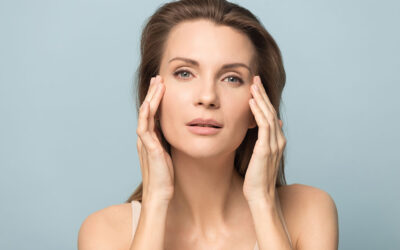Retinoids provide some of the most impressive results within the realm of skin care products. Retinoids are a family of compounds that include Vitamin A and its relatives. When applied to the skin, these compounds promote collagen formation and increase the turnover of skin cells. Retinoids are proven to reduce wrinkles, improve skin texture, and lighten dark spots. They also help unclog pores and treat acne. The powerful anti-aging and anti-inflammatory properties of retinoids yield a clearer and more youthful complexion. Supported by countless research studies, retinoids have earned the title of being the gold standard ingredient for skin rejuvenation.
There are several types of retinoids available for skin care. Typically, stronger retinoids are associated with increased skin irritation and other side effects. An ideal retinoid should be strong enough to achieve your skin care goals, while minimizing skin irritation. The most common types of retinoids include tretinoin and retinol.
Tretinoin (also referred to as retinoic acid) is a type of retinoid that is a prescription medication. There are several brand names of tretinoin, such as Retin-A. Tretinoin is a very strong retinoid and has a relatively higher potential of causing skin sensitivity. Many studies have strongly supported the benefits of tretinoin for achieving healthier and more youthful appearing skin. One study showed that sun damaged skin treated with tretinoin for 10 to 12 months resulted in an 80% increase in collagen formation.
Retinol is a gentler type of retinoid and is available over the counter. Similar to tretinoin, many studies have proven that retinol reduces wrinkles, smoothens skin texture, and decreases discoloration. Although the effects may not be as strong as tretinoin, retinol also increases skin thickness and promotes collagen. This has been proven on a molecular level through the analysis of skin biopsies. Retinol is a popular retinoid that is the ideal strength for many skin care regimens. Retinol is typically a great product to use if you are starting to use a retinoid, have sensitive skin, or only have early signs of aging.
Initial Sensitivity & Purging
When starting a retinoid treatment, your skin will first undergo a process referred to as “retinization”. During this period, your skin is adjusting to the retinoid and you may experience skin irritation. If this occurs, it usually involves temporary redness, dryness, and flaky skin. You may also have a mild itchy, stinging sensation. If these symptoms are severe or due to an allergic reaction, you should stop using the retinoid and be evaluated by a specialist.
“Retinoid purge” is another term used to describe the initial period of using a retinoid. The concept is based on the fact that retinoids speed up the rate your body produces new skin cells. In the long run, this is a good thing because new skin cells migrate to surface of your skin at a faster rate, resulting in a fresher appearance. However, as the original deeper skin cells are first migrating to the skin surface, this may result is a worse appearance.
If you develop signs of retinization and purging, this usually resolves within several weeks. This is why you should be prepared for the possibility that things may get worse before they get better.
Even if you do not have any significant signs of skin irritation, your skin is more sensitive when you first start using a retinoid. It is especially important to properly care for your skin in a gentle manner during this period. A gentle moisturizer will help improve the skin’s moisture barrier and soothe irritation. You should also avoid other skin care products that can contain harsh ingredients.
Sun Exposure
During retinoid treatment, your skin is more sensitive to sunlight. Therefore, it is even more important to avoid sun exposure and to wear proper sunscreen during the day. In addition, sunlight can break down various retinoids and make them less effective. As such, I recommend using retinoids during the evening.
Application
Ideally, you should apply retinoids nightly. For some people, this may initially cause too much irritation. If this is the case, you may need to space out the application to every other night or every third night. You would then slowly increase the frequency to once a night. If you have very sensitive skin, you may also benefit from using a moisturizer after applying the retinoid. You can click here to review a more detailed blog about applying retinoids.
Timeline
Retinoids require long-term, consistent use for best results. Over the first few months you will notice that your skin is smoother. In addition, you may develop a mild rosy glow that is associated with increased blood flow to your healthier skin. Collagen formation will continue to ramp up and wrinkles will continue to soften. Results vary depending on your individual skin and the specific product used, but you will likely notice significant improvement within 2 to 6 months. It is important to continue using the retinoid to improve your long-term results. One study confirmed continued improvement in collagen even after 2 years of using tretinoin. You can see the long term result of healthier appearing skin in this video of 61-year-old woman who has been using Retin-A (tretinoin) for 28 years!
Consultation
During your visit, I will evaluate your skin and consider your goals. I will then help select the appropriate retinoid for your customized skin care regimen. I carry my own retinol products (Retinol 0.5% and Retinol 1.0%), but there are also many other excellent retinol products available in stores that you can use. If you are a candidate for a stronger treatment, I may prescribe you a retinoid such as tretinoin. Another option may include prescribing you a custom compounded retinoid formulation.



